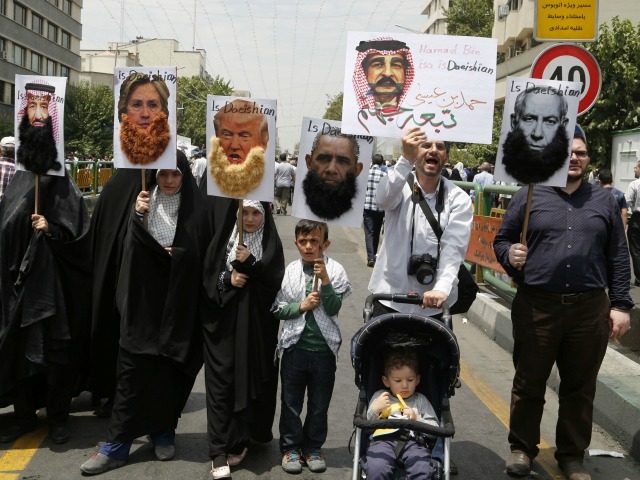The government of Bahrain announced Sunday that it had arrested over a dozen individuals believed to have planted a bomb on a police bus and received training from Hezbollah and the government of Iran.
The arrests arrive as reports suggest the administration of President Donald Trump is considering designating the Iranian Revolutionary Guard Corps (IRGC), a branch of the Iranian military, a terrorist organization. In response, Iranian politicians have threatened to designate the U.S. military a terrorist organization under Iranian law.
Bahrain’s interior ministry issued a statement Sunday confirming the arrests of 14 individuals who “are suspected of receiving overseas military training under the supervision of the Iranian Revolutionary Guards and Hezbollah in Iraq,” according to the Associated Press. The men were arrested as part of a larger raid on a property that authorities claimed was stocked with weapons; police say the terror cell was planning assassinations, though they did not specify if they believed the men were targeting any officials in particular.
The Sunni-friendly outlet al-Arabiya adds that authorities believe the alleged terrorists arrested were working under the supervision of Mortadha Majeed al-Sindi and Qassim Abdullah Ali, the latter of which has received a “Specially Designated Global Terrorist” label from the U.S. State Department. Reuters identifies both men as “exiled Bahrainis living in Iran.” In addition to being led by individuals living in Iran, the terror cell boasted a number of individuals with ties to Iranian terror groups. Voice of America cites local outlets who reported that official identified five alleged terrorists as having received training from Hezbollah, and another six who had been trained by IRGC leaders.
The Iranian government has denied any ties to this terrorist cell. Iranian Foreign Ministry spokesman Bahram Qassemi called the allegations of ties to the IRGC “false, baseless, and useless.” And “instead of making repetitive vain attempts to divert attention, the Bahraini government had better focus its efforts on respecting the rights of Bahraini citizens and ending the crackdown and arrests of clerics,” Qassemi said in a statement, according to Iran’s Tasnim News Agency.
While Bahrain’s government is Sunni, the majority of its citizens are Shiite Muslims, a source of significant tension between authorities and Muslims in the island nation. Bahrain’s government began to crack down on protesters during the Arab Spring of 2011, arresting upwards of one thousand protesters using tactics that NGOs like Human Rights Watch alleged were violations of Bahrainis’ human rights.
Throughout these crackdowns, Bahrain accused Iranian officials of helping agitate Shiite protesters and consistently sided with Saudi Arabia on bilateral disputes between the two regional powers. In January 2016, for example, Bahrain suspended all flights to and from Iran to show solidarity with Saudi Arabia after the two nations cut diplomatic ties entirely following the execution of a radical Shiite cleric by Riyadh. That same month, Bahrain announced it had “foiled… a secret terrorist plot aided by the so-called Iranian Revolutionary Guard and the Hezbollah terrorist organization,” in an incident resembling that this week.
By June, Bahrain officially banned the major Shiite opposition party in the country, al-Wefaq, alleging that the group was inspiring and organizing violent protests against the Sunni leadership and generally promoting a “spirit of hatred.” Iran responded to this incident with threats.
Qassem Soleimani, the lead of the IRGC’s “Quds Force,” considered the secret terrorist operation wing of the Iranian military, vowed to “topple” the “bloodthirsty regime” in Bahrain by launching “a bloody intifada with consequences whose responsibility will fall on those who legitimize the arrogance of the Bahraini rulers.”
The IRGC has since continued its belligerent activity in the region, repeatedly threatening U.S. vessels sailing legally through waters near Iran and enlarging its presence in Syria, where Tehran has maintained its close ties to dictator Bashar al-Assad. In February, reports surfaced that the Trump administration is considering an official terror designation for the IRGC. Unnamed U.S. officials told Reuters that “several U.S. government agencies have been consulted about such a proposal, which if implemented would add to measures the United States has already imposed on individuals and entities linked to the IRGC.” The U.S. government has particularly highlighted Soleimani’s Quds Force as having ties to Hezbollah and other international terrorist organizations.

COMMENTS
Please let us know if you're having issues with commenting.